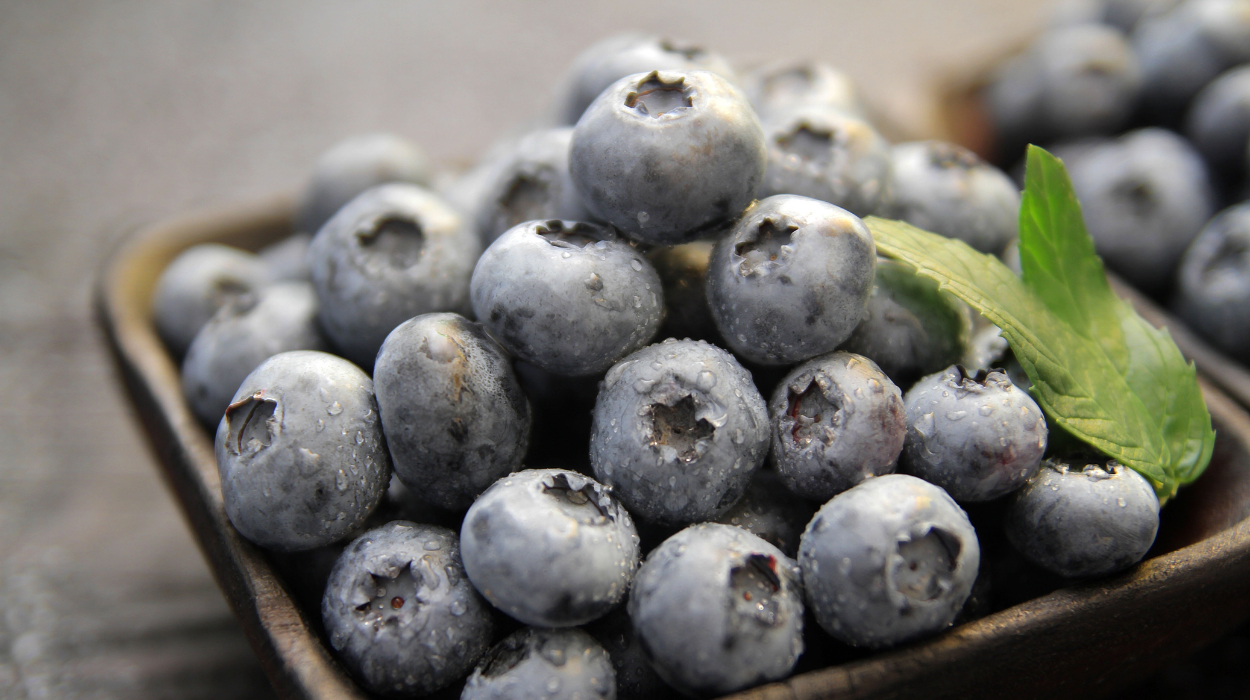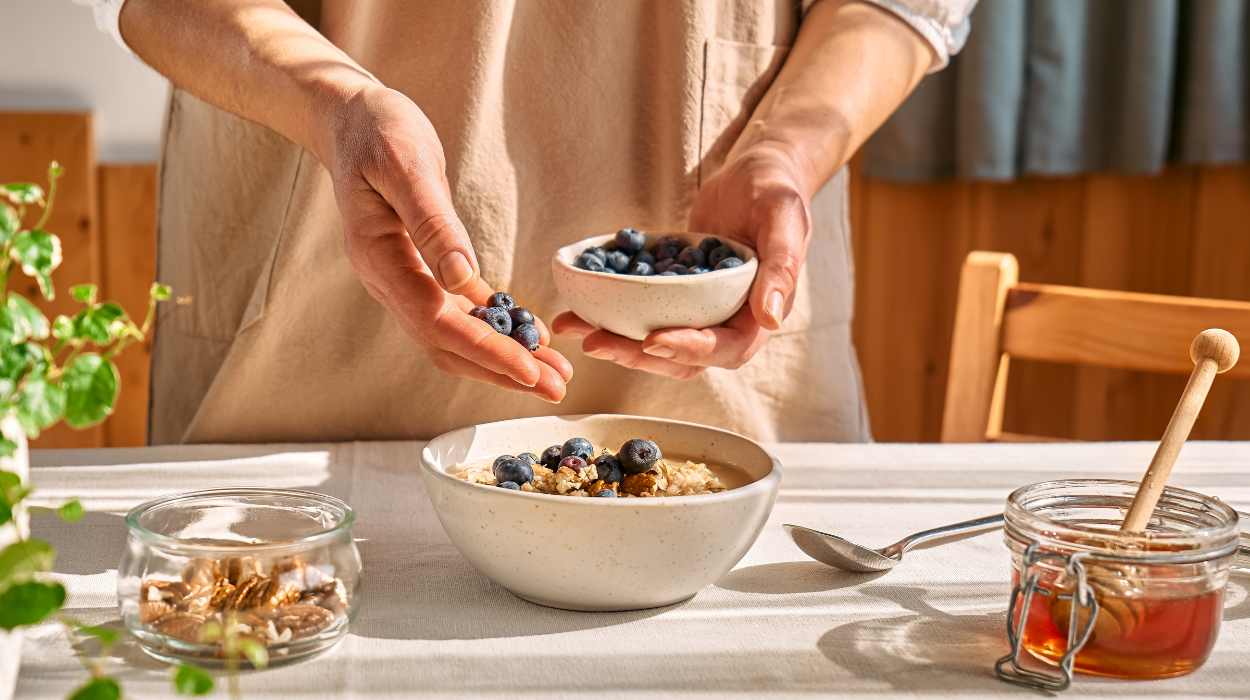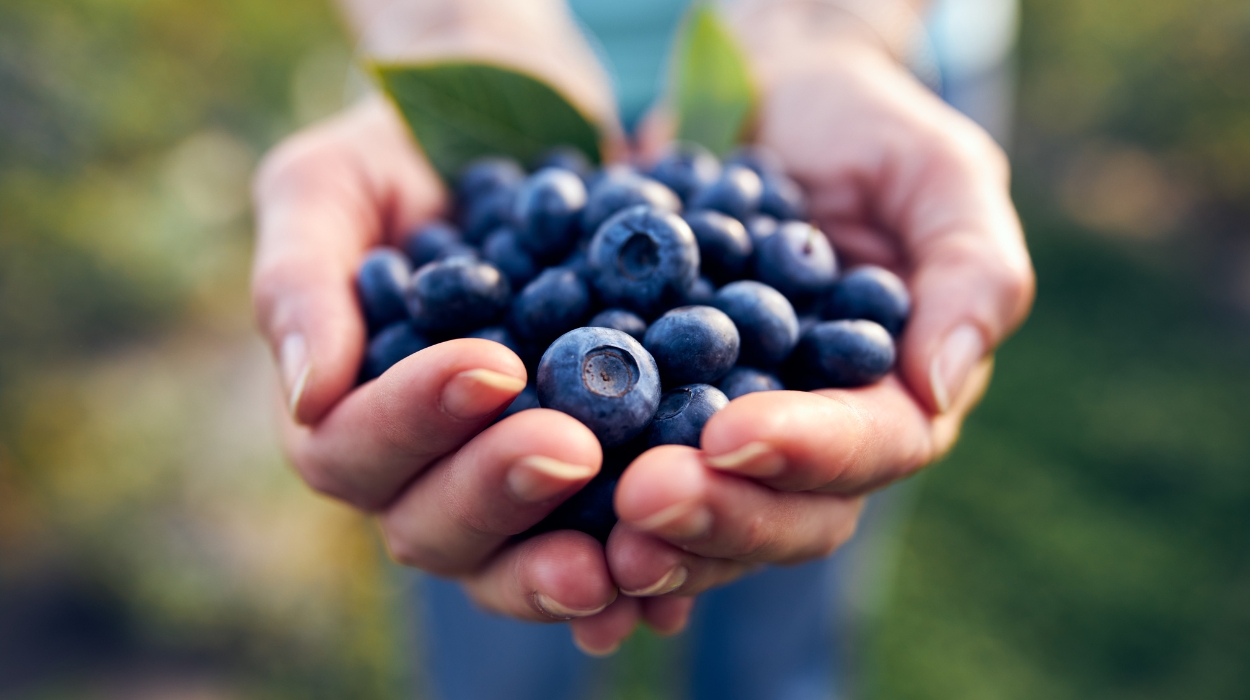Blueberries grow mainly in North America, Canada, and Asia. They are among the healthiest of the berries and have been a popular subject of research recently. Berries are linked with health-promoting benefits for conditions[1] including cardiovascular disease, metabolic disorders, and cancer.
These tiny fruits are packed with nutritional components. Blueberries are full of health-benefiting phytochemicals, vitamins, and fiber. Blueberry’s bioactive compounds provide anti-inflammatory and antioxidant[2] qualities that promote cellular health.
Research indicates this powerhouse berry may support weight management and improve obesity-related conditions[3] such as high blood sugar and insulin resistance. That being the case, are blueberries good for weight loss? Let’s look further into the benefits of blueberries and how they may support weight loss.
Are Blueberries Good For You To Lose Weight?
Blueberries provide essential nutrients including vitamins and minerals. They contain phytochemicals known as phenolic compounds, specifically flavonoids called anthocyanins. These compounds offer many health benefits and may support weight loss.
Are Blueberries Good For Weight Loss?

Eating a low-calorie diet is necessary for any weight loss plan. Most types of fruit have anti-obesity effects[4] when consumed as part of a healthy, low-calorie diet. Consuming blueberries provides you with essential nutrients that are important when managing a healthy lifestyle and support your weight loss journey.
One cup of blueberries contains only 84 calories,[5] making it a low-calorie food. Plus, it has a high fiber content, which is associated with supporting weight loss. The phytochemical properties of blueberries, most notably anthocyanins, provide health benefits, including lower fat mass[2] and less of a tendency to gain weight.
A systematic review involving blueberry consumption[6] reported a beneficial association with obesity and type 2 diabetes, decreased inflammation, improved glucose metabolism, and gut health. A 2019 study on mice showed improved obesity[3] via gut microbiota regulation and fat metabolism in the liver with blueberry extract treatment.
A 2023 study involving the effects of freeze-dried wild blueberry supplementation with exercise demonstrated a significant increase[7] in fat burning during moderate-intensity exercise. A review of anthocyanins’ effects on obesity noted that blueberries improved fat metabolism,[8] supported weight maintenance, or aided in losing weight in those who were obese.
Experts reported further research is necessary to determine the nature of blueberry components and their actions concerning obesity fully. No direct correlation was noted in the above studies regarding reducing belly fat specifically.
Why Are Blueberries Good For Weight Loss?
Anthocyanins[9] belong to a subgroup of polyphenols called flavonoids. Blueberries contain high amounts of anthocyanins, which are noted for their anti-inflammatory properties. Anthocyanins are responsible for their blue color as well.
A cross-sectional study reported that a higher intake of anthocyanins[10] is associated with less insulin resistance. Insulin resistance is connected to obesity and metabolic syndrome. Diets high in flavonoids may improve glucose metabolism[10] and positively affect digestive system hormones. This process slows gastric emptying, which means delayed stomach pass of foods, and satisfies appetite, offering anti-obesity benefits.
Low-grade inflammation is linked with obesity and obesity-related conditions. Phenolic compounds provide protective qualities[6] toward cell health and may promote cell repair of damaged cells by oxidative stress. Consuming blueberries indicated a gradual decrease in the inflammatory processes[6] occurring on the cellular level, resulting in a positive effect on cardiometabolic diseases like heart disease and type 2 diabetes.
Blueberries contain high amounts of fermentable dietary fibers,[6] which support gut health and help reduce low-density lipoprotein, or LDL, cholesterol levels. LDL cholesterol is also known as bad cholesterol, which may harm your blood vessels and organs. Anthocyanins interact with gut microbiota forming prebiotic food.[6] These processes are associated with decreasing obesity-related inflammation.
Overall it appears eating blueberries offers health benefits that may include weight loss and management. Further research is required to determine the exact benefits of human versus animal laboratory studies.
Other Health Benefits Associated With Blueberries
More people are incorporating blueberries into their diet due to their nutritional content. In addition to the phenolic compounds and fiber noted above, they provide high amounts of vitamin C, several B vitamins, and vitamin E. These vitamins are antioxidants with cell protection properties. Researchers found antioxidants provide health benefits for many of the body’s systems.
- Antioxidants provide neuroprotective support[2] for cognitive and neurological disorders like Alzheimer’s. Older adults showed cognitive improvements after 12 weeks of daily blueberry supplementation, thus aiding brain health.
- They are associated with decreased retinal inflammation,[2] offering vision support.
- Blueberry consumption reduces type 2 diabetes health markers[2] such as improved insulin sensitivity and fasting glucose levels.
- Cardiovascular benefits include improved blood vessel function[2] with decreased blood pressure and artery stiffness, making them heart-healthy.
How To Add Blueberries To Your Diet To Lose Weight

Several studies involving blueberries utilized them in different forms. Some used whole fruit; others utilized extracts or freeze-dried blueberries. Fresh or frozen blueberries are nutritious choices when considering how to eat blueberries for weight loss. However, fresh berries only have about a one to two-week shelf life if kept in the fridge; therefore, quickly freezing blueberries will preserve most[2] of their nutritional content without spoiling.
Wild blueberries contain the highest amount of phenolic content,[4] so you will want to add them to your diet for their health benefits. During processing, they can lose healthy essential nutrients; therefore, if you choose blueberry jam or jelly, be aware of that aspect — and the sugar content if you deal with blood sugar issues. Freeze-drying helps blueberries keep the majority of their phytochemical qualities.[2]
Here are some healthy options to use blueberries for weight loss:
- Add blueberries to low-calorie yogurt.
- Top off your oatmeal or add to overnight oats.
- Mix dried blueberries into your trail mix or granola.
- Add to a salad, quinoa, or rice dish.
- Blueberry banana pancakes.
- Multiple berry antioxidant-packed smoothie.
- Acai bowl with blueberries.
- Blueberry sorbet or ice cream using bananas as a healthier option.
- Blueberry muffins or oven-baked crisp.
Other Factors To Consider On Your Weight Loss Journey
Weight loss requires a multifaceted approach, with a low-calorie diet being an important factor. We have established that eating blueberries is good for you to lose weight. However, several other items must be addressed to attain your goals.
- Exercise at a moderate intensity for at least 150 minutes per week, including two sessions of resistance training per the CDC.[11]
- Consume plenty of plant-based foods like fruits, vegetables, and beans that are low-calorie and offer high-quality nutrition to support maintaining a calorie deficit, which is necessary for weight loss.
- Manage your stress levels[12] which, if elevated, can contribute to increased abdominal fat.
- Get enough sleep since poor sleep patterns can lead to weight gain and inhibit losing weight.
- Drink enough water to stay hydrated, which may support appetite suppression.[13]
- Consider using dietary supplements to increase your consumption of fruit and vegetables and improve access to the nutritional benefits of greens.
The Bottom Line
Losing body fat is complicated and requires the utilization of multiple resources. A healthy, low-calorie diet that creates a calorie deficit is the most important factor.
Blueberries contain nutrients and phytochemicals that research reports promote good health and may aid weight loss. They provide anti-inflammatory and antioxidant qualities that are beneficial for chronic health conditions and are associated with weight loss.
Paying attention to all lifestyle factors is essential to losing weight successfully. The proper amount of physical activity, sleep, and water intake is important. Managing your stress level and getting adequate nutrition from your diet promote health benefits in addition to supporting weight loss.
Overall, lifestyle changes, including consuming a balanced, low-calorie diet containing nutritional foods like blueberries, are healthy approaches to long-term weight management.
Frequently Asked Questions
No. One cup of blueberries, about 148 grams, contains about 84 calories.
Research indicates consuming blueberries supports weight loss and management, but no studies cited above reported specific belly fat loss.
Approximately one cup of blueberries contains nutritional and health benefits that may support weight loss.
Frozen blueberries provide adequate nutritional benefits compared to fresh blueberries.
 Evidence Based
Evidence Based
